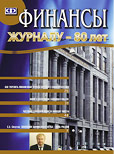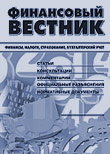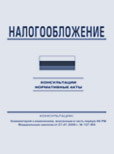Содержание
Актуально
В интервью заместитель министра финансов Российской Федерации
А.В. Моисеев (e-mail: pr.moiseeva@minfin.ru) рассказал о том, что сделано для появления в России «длинных» финансовых ресурсов, какие меры предприняты для привлечения средств граждан на финансовый рынок, в негосударственные пенсионные фонды, ответил на вопросы о программе строительства доходных домов и другие.
Ключевые слова: негосударственные пенсионные фонды, финансовый рынок, инвестиции, акции, облигации, брокеры, индивидуальные инвестиционные счета, страхование.
Казначейство: становление и развитие
В.А. Мартьянова, руководитель Управления Федерального казначейства по Саратовской области
С.А. Бурцев, начальник отдела кассового обслуживания исполнения бюджетов Управления Федерального казначейства по Саратовской области
Тел. (8452) 99-20-27u
Сегодня существует целый ряд механизмов, которые используются территориальными органами Федерального казначейства для повышения ликвидности счетов региональных бюджетов и бюджетов муниципалитетов, являющихся неотъемлемой частью консолидированного бюджета страны.
В статье речь идет о наиболее актуальных механизмах, успешная реализация которых содействует обеспечению исполнения принятых бюджетных обязательств.
Ключевые слова: ликвидность, размещение временно свободных средств, бюджетный аккредитив.
На вопросы читателей отвечают специалисты Минфина России и Федерального казначейства.
Анонс книги, которая выходит в начале 2017 года.
Налоги: теория и практика
В.Г. Пансков, профессор департамента налоговой политики и таможенно-тарифного регулирования Финансового университета при Правительстве РФ, доктор экономических наук, заслуженный экономист РФ, академик Российской Академии естественных наук (РАЕН), государственный советник налоговой службы первого ранга
E-mail: 5868116@mail.ru
На основе проведенного анализа установлено недостаточное теоретическое обоснование сущности и практики применения действующей в мировой экономике системы обязательных платежей населения и бизнеса. До настоящего времени не выработаны единые принципы их построения и признаки классификации, вследствие чего национальные системы обязательных платежей в каждом государстве строятся исходя из собственных правил и интересов. Обоснована позиция, согласно которой налоговые сборы по основным признакам ближе к фискальным сборам, чем к налогам. Установлено, что российская система обязательных платежей формируется хаотически, без достаточного теоретического обоснования и без учета накопленного мирового опыта. Сделан вывод, что в стране фактически сформирована законодательно не отрегулированная параллельная налоговая система без закрепления единого порядка установления, введения в действие входящих в нее обязательных платежей. Обоснована необходимость упорядочить законодательную практику формирования взимаемых в стране различного рода платежей, сборов, взносов и отчислений. Предложен авторский признак классификации действующих в стране обязательных платежей, направленный на упорядочение их установления и взимания.
Ключевые слова: налог, налоговые сборы, обязательные платежи, параллельная налоговая система, парафискалитеты, сбор, фискальные сборы.
Н.И. Малис, профессор департамента налогового и таможенно-тарифного регулирования Финансового университета при Правительстве РФ
E-mail: Malis.nina@mail.ru
Автор доказывает, подкрепляя свои выводы расчетами и ссылками на международную практику, что введение в России акцизов на сладкие газированные напитки, пальмовое масло, шоколад даст совершенно незначительный эффект с точки зрения пополнения доходной части бюджета, но приведет к гораздо более серьезным экономическим потерям, сокращению рабочих мест и т.д. Вместо этого предлагается более практичное решение – повышения на 2% НДС на сахар как вредный для здоровья продукт.
Ключевые слова: акцизы, налоговые поступления, подакцизная продукция, налоговое администрирование.
Л.И. Данилькевич, доцент Департамента налогового и таможенно-тарифного регулирования Финансового университета при Правительстве РФ, кандидат экономических наук
E-mail: danilkevich@yandex.ru
В статье рассматриваются проблемы, связанные с государственной регистрацией юридических лиц, осуществляемой налоговыми органами, с учетом новых правил, внесенных в последнее время в Федеральный закон от 8 августа 2001 г. № 129-ФЗ «О государственной регистрации юридических лиц и индивидуальных предпринимателей».
Ключевые слова: регистрация юридических лиц, заявление о государственной регистрации, орган, осуществляющий государственную регистрацию, сроки и место государственной регистрации, заявление, государственная пошлина, нотариальное заверение.
E-mail: Finance-journal@mail.ru
Излагаются основные тезисы выступлений на семинаре в НИФИ Минфина РФ, посвященных поиску баланса частных и публичных интересов при получении налоговой выгоды. Среди докладчиков представители Конституционного Суда РФ, научных кругов и консультационного бизнеса. Также затрагивалась тематика BEPS и проблемы терминологии.
Ключевые слова: налоговая выгода, двойное налогообложение, налогоплательщик, контролируемые и неконтролируемые сделки.
E-mail: Finance-journal@mail.ru
В материале излагаются основные тезисы выступлений участников заседания рабочей группы ТПП по управлению налоговыми рисками, состоявшейся 19.10.2016, среди которых были начальник управления камерального контроля ФНС А.В. Егоричев и глава РГ П.А. Гагарин. Обсуждались такие темы как требования к внутреннему контролю; перспективы перехода к бездокументарному налоговому контролю, как показалось, не очень отдаленные; асимметрия при защите интересов бюджета и компаний при погашении недоимок и возврате излишне уплаченных налогов.
Ключевые слова: управление рисками, ФНС, внутренний контроль, погашение недоимок, возврат излишне уплаченных налогов.
Страхование
E-mail: finvestnil@mail.ru
На очередной сессии форума финансовых директоров страхового бизнеса состоялось обсуждение хода формировоания регулятивной среды страхового бизнеса. Были представлены подходы и взгляды ЦБР, с одной стороны, ряда страховых компаний – с другой, а также экспертиза саморегулируемых организаций.
Ключевые слова: надзор, системно значимые компании, дифференцированный режим, операционные риски страховщиков, активы и инвестиции, переход на ОСБУ.
К 90-летию журнала
Это – статья
А.Я. Лившица (1946–2013), бывшего в то время заместителем председателя Правительства РФ – министром финансов РФ из январского 1997 года журнала.
Мнения
Б.М. Ческидов, доктор экономических наук, действительный член Академии военных наук
E-mail: elena@khovansky.ru
Дискуссия о характере воздействия на национальную экономику военных расходов, в большинстве ведущих стран мира составляющих значительную часть государственного бюджета приобретают для России особую актуальность в текущей военно-политической ситуации. Автор рассматривает статистику военных бюджетов групп стран, сопоставляет военные расходы этих стран и РФ и делает выводы о том, как определить военный бюджет периода непосредственной подготовки к войне, бюджет военного и бюджет мирного времени, также характеризует влияние каждого из них на экономику, которое принципиально различно.
Ключевые слова: военные расходы, военный бюджет, воздействие на экономику, милитаризация бюджета.
Финансы социальной сферы
Ю.П. Калмыков, в.н.с. НИИ Счетной палаты РФ, кандидат экономических наук, профессор
E-mail: kalmykov.up@niisp.ru
В рамках статьи исследуются финансовые риски в условиях перехода территориальных органов Фонда социального страхования РФ на прямые выплаты пособий по обязательному социальному страхованию на случай временной нетрудоспособности и в связи с материнством и от несчастных случаев на производстве и профессиональных заболеваний.
Дается научное обоснование предложений по обеспечению сбалансированности бюджета Фонда социального страхования РФ в условиях реализации механизма прямых выплат пособий застрахованным гражданам.
Ключевые слова: страхование, внебюджетные государственные фонды, федеральный бюджет, право, финансовые риски.
А.П. Архипов, профессор РЭУ им. Плеханова, доктор экономических наук
E-mail: AArkhipoff@yandex.ru
Проведенный анализ динамики и структуры финансирования российского здравоохранения выявил значительную (30%) долю платных медицинских услуг, «теневых платежей» и оплаты лекарств из личных и корпоративных средств при снижении доли добровольного медицинского страхования. Страховые принципы финансирования здравоохранения, предложенные в проекте «Стратегии развития здравоохранения Российской Федерации на долгосрочный период 2015–2030 гг.» носят декларативный характер, утверждает авто. Он соглашается с предложениями ограничить предоставление медицинской помощи по программам ОМС только тем лицам, за которых уплачены страховые взносы. Работа по актуализации баз данных об уплате страховых взносов может быть возложена на страховые медицинские организации, что позволит сохранить их в системе ОМС.
Ключевые слова: финансирование здравоохранения, медицинское страхование обязательное и добровольное, платные медицинские услуги, оплата страховых взносов, теневая экономика.
Комментарий от редакции.
Д.В. Дементьев, кандидат экономических наук, доцент кафедры общественных финансов Новосибирского государственного университета экономики и управления, доцент кафедры аудита, учета и финансов, Новосибирского государственного технического университета
E-mail: ddw68@yandex.ru
Экономика здравоохранения в настоящее время находится в центре внимания органов государственной власти, медицинских организаций и населения. В условиях ограниченных финансовых ресурсов переход на одноканальное финансирование учреждений здравоохранения на основе нормативного подхода предполагает повышение заинтересованности этих учреждений в эффективном использовании средств и в оказании качественных медицинских услуг. Цель статьи заключается в том, чтобы на материалах субъектов Сибирского федерального округа оценить социально-экономические условия и проблемы при определении объемов финансирования учреждений в условиях одноканальной системы. На основе открытых статистических данных и нормативных актов проведен анализ показателей состояния здравоохранения, ряда показателей территориальных программ обязательного медицинского страхования с целью оценки роли нормативов на формирование финансового обеспечения учреждений здравоохранения. Сделан вывод о важности и необходимости дифференциации нормативов финансовых затрат, подушевых нормативов и тарифов с целью достижения баланса потребностей учреждений в источниках финансирования и возможностей результативного их использования.
Ключевые слова: бюджет, здравоохранение, нормативы, одноканальное финансирование, медицинская услуга.
Annotation
In an interview deputy Minister of Finance of the Russian Federation A.V. Moiseev (e-mail: pr.moiseeva@minfin.ru) told about what was made for emergence of “long” financial resources in Russia, measures taken to attract funds of citizens on the financial market, non – state pension funds, answered the questions about construction of tenements houses and other.
Keywords: non – state pension funds, financial market, investments, stocks, bonds, brokers, individual investment accounts, insurance.
V.A. Martyanova, head of Administration of the Federal Treasury across the Saratov region
S.A. Burtsev, head of Department of Cash service of budgets execution of Administration of the Federal Treasury across the Saratov region
Phone: (8452) 99-20-27
Today there are a number of mechanisms which are used by the territorial bodies of the Federal Treasury for increase of liquidity of accounts of regional budgets and budgets of municipalities that are the integral part of consolidated budget of the country.
Article tells about the most important mechanisms which successful implementation contributes to ensuring the fulfilment of adopted budgetary obligations.
Keywords: liquidity, placement of temporary free funds, budget letter of credit.
Specialists of the Ministry of Finance of Russia and Federal Treasury answered the questions of readers.
The announcement of the book that will be published in early 2017.
V.G. Panskov, professor of the Department of the Tax policy and Customs tariff regulation of the Financial University under the Government of the Russian Federation, doctor of economics, honored economist of the Russian Federation, academician of the Russian Academy of Natural Sciences (RAEN), state adviser of tax service of the first rank
E-mail:5868116@mail.ru
On the basis of the analysis it is established insufficient theoretical justification of the substance and applicable practice of obligatory payments of individuals and business in the current world economic system. It is revealed that until the present common principles of creating obligatory payments and symptoms classification aren’t elaborated, as a result national systems of obligatory payments are created in the each state on the basis of their rules and interests. It is justified that tax fees in the main features are closer to fiscal charges than taxes. It is established that Russian obligatory payments system is generated randomly without sufficient theoretical justification and accumulated world experience. The conclusion is that actually in the country legally unregulated parallel tax system is formed without consolidation of single procedure of the establishment, imposing of obligatory payments. The necessity of organize legal practice of forming various kinds of charges is justified. The author feature of obligatory payments classification aimed at consolidation of the establishment and imposing them is proposed.
Keywords: tax, tax fees, obligatory payments, parallel tax system, parafiscality, collection, fiscal charges.
N.I. Malis, professor of Department of Tax and Customs – tariff Regulation of the Financial University under the Government of the Russian Federation
E-mail: Malis.nina@mail.ru
On the basis of calculations and references to international practice author proves that introduction of excises on sweet carbonated drinks, palm oil, chocolate in Russia will give a completely negligible effect from the point of view of replenishment of revenue budget part, but will lead to much more serious economic loses, loss of jobs and etc. Instead of this there is a more practical solution – 2% increase of VAT on sugar as a harmful product.
Keywords: excise, tax revenues, excisable products, tax administration.
L.I. Danilkevich, associate professor of Department of Tax and Customs – tariff Regulation of the Financial University under the Government of the Russian Federation, candidate of economic sciences
E-mail: danilkevich@yandex.ru
Article considers the problems connected with state registration of legal entities conducted by tax authorities taking into account new rules recently introduced into the Federal Law from 8th August 2001 №129 – FL “On state registration of legal entities and individual entrepreneurs”.
Keywords: registration of legal entities, application on state registration, authority performing the state registration, terms and place of the state registration, application, state fee, notarization.
E-mail: Finance-journal@mail.ru
Article outlines the main theses of speeches at seminar in the Financial Research Institute of the Ministry of Finance of the Russian Federation devoted to search of balance between private and public interests while receiving tax benefits. Among the speakers there were representatives of the Constitutional Court of the Russian Federation, scientific communities and consulting business. Also the theme of BEPS and problems of terminology were discussed.
Keywords: tax benefit, double taxation, tax payers, controlled and uncontrolled transactions.
E-mail: Finance-journal@mail.ru
Article outlines the main theses of participants speeches of the working group meeting of Chamber of Commerce and Industry on tax risks management passed on 19.10.2016, among them there were head of Administration of Cameral Control of the Federal Tax Service – A.V. Egorichev and head of RG – P.A. Gagarin. The following topics were discussed: requirements to internal control, prospects of transition to undocumented tax control, asymmetry in protection of budget interests and companies during repayment of arrears and refund of overpaid taxes..
Keywords: risk management, Federal Tax Service, internal control, repayments of arrears, refund of overpaid taxes.
E-mail: finvestnil@mail.ru
During the regular session of forum of financial directors of insurance business there was discussed the course of formation of the regulatory environment of the insurance business. Approaches and views of CBR, number of insurance companies and expertise of self – regulated organizations were presented.
Keywords: supervision, systemically important companies, differential regime, operational risks of insurers, assets and investments, transition to Industry Standards of Accounting.
Article of A.Y. Livshits (1946 - 2013), deputy Chairman of the Government of the Russian Federation – Minister of Finance of the Russian Federation published in the journal in January 1997.
B.M. Cheskidov, doctor of economic sciences, full member of the Academy of Military Sciences
E-mail: elena@khovansky.ru
Discussion about the character of the impact of military spending on national economy, which is the most significant part of the state budget in majority of leading countries, becomes particular relevant for Russia in current political and military situation. Author examines the statistics of military budgets of group of countries, compares military spending of these countries and Russia and makes conclusion how to determine military budget of the period of direct preparation for war, budget of military time and budget of peacetime, also characterizes the impact of each of them on the economy which is fundamentally different.
Keywords: military spending, military budget, impact on economy, militarization of budget.
U.P. Kalmykov, leading research officer of the NII of the Accounts Chamber of the Russian Federation, candidate of economic sciences, professor
E-mail: kalmykov.up@niisp.ru
This article investigates the main trends of the development of the financing mechanism and insurance payments purpose on compulsory social insurance for temporary disability and maternity and compulsory social insurance against industrial accidents and occupational diseases, in order to enhance the social protection of citizens and ensuring the financial sustainability of the Russian Social Insurance Fund.
This article also justifies the new model of insurance payouts, which has been developed to provide new scientific approaches for mitigation of financial risks.
Keywords: insurance, public funds, federal budget, law, financial risks.
A.P. Arhipov, professor of the Plekhanov Russian University of Economics, doctor of economic sciences
E-mail: AArkhipoff@yandex.ru
The analysis of the dynamics and structure of financing of the Russian healthcare system has revealed a significant (30%), the share of paid medical services, the "shadow payments" and pay for the drugs from personal and corporate funds the decline in the share of voluntary medical insurance. It is shown that the financing of programs of obligatory medical insurance is carried out with a deficit.
A study of the development of insurance principles of health care financing proposed in the project "strategy of development of health of the Russian Federation on a long-term period of 2015 – 2030 years", showed their declarative nature, not corresponding to established practice and current legislation. As a result of transferring the administration of compulsory social insurance contributions to the Federal tax service excluded health insurance companies from the system of compulsory medical insurance.
The studies discussed in the society of proposals for reducing the deficit in the compulsory health insurance system proved the feasibility of the proposal to limit the provision of health care by compulsory medical insurance programs only to those persons for whom insurance premiums are paid. The process of updating the databases of the payment of insurance premiums and suspension of medical insurance for non-payment of fees may be imposed on health insurance companies that will keep them in the system of mandatory medical insurance.
Keywords: health financing, health insurance, mandatory and voluntary, paid medical services, insurance payments, shadow economy.
Comments from editorial.
D.V. Dementev, candidate of economic sciences, associate professor of chair of Public Finance of the Novosibirsk State University of Economics and Management, associate professor of chair of Audit, Accounting and Finance of the Novosibirsk State Technical University
E-mail: ddw68@yandex.ru
Health economics is now the center of attention of public authorities, health organizations and the public. With limited financial resources, the transition to single-channel financing of health facilities based on normative approach involves raising the interest of these institutions in the efficient use of resources and in the provision of quality health services. The purpose of the article is that on the materials of the Siberian Federal District to assess the socio-economic conditions and problems in determining the funding agencies in a single-channel system. On the basis of public statistics and regulations it was held the analysis of health status indicators, a number of indicators of territorial programs of compulsory medical insurance in order to assess the role of regulations on the formation of financial provision of health facilities. The conclusion about the importance and the need for differentiation of norms of financial costs, per capita norms and tariffs in order to achieve balance the needs of institutions in the sources of financing and the effective use of their opportunities was made.
Keywords: budget, health, norms, single-channel financing, medical service.











